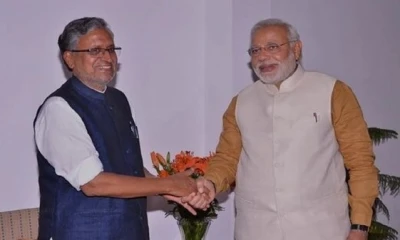Sushil Kumar Modi, the former Deputy Chief Minister of Bihar, breathed his last on May 13 after an eight-month battle with cancer, leaving behind a legacy of invaluable contributions to the Bharatiya Janata Party’s ascent in the State.
Prime Minister Narendra Modi was among the first to extend condolences, acknowledging Sushil Modi’s pivotal role in the BJP’s rise and success in Bihar.
Sushil Modi is widely recognised as a key architect of the Saffron party’s growth in Bihar, emerging as its towering figure after Kailashpati Mishra, the former Finance Minister of the State.
The BJP’s journey in Bihar saw a significant turning point in 1995 when it emerged as the principal Opposition party. Over the next 25 years, it steadily climbed the political ladder, culminating in its position as the second-largest party in the 2020 Bihar assembly elections, securing 74 seats in the 243-member State assembly.
Despite its numerical strength, the BJP continues to work in tandem with Chief Minister Nitish Kumar-led Janata Dal (United) in the State’s National Democratic Alliance or NDA Government, with Nitish Kumar retaining the Chief Ministerial position.
Sushil Modi’s political journey began in 1990 when he entered active politics and won the assembly election from the now-abolished Patna Central Assembly seat. He went on to secure re-election in 1995 and 2000, strengthening his position in Bihar’s political field.
In 2004, Sushil Modi shifted to national politics by winning the Bhagalpur Lok Sabha seat. However, his dedication to Bihar saw him resign from the Lok Sabha in 2005 to assume the role of Chief Minister Nitish Kumar’s Deputy, entrusted with the Finance Portfolio and other key departments. He continued in this capacity after the NDA’s victory in the 2010 Bihar assembly polls.
Sushil Modi played a crucial role in encouraging alliances between the BJP and Nitish Kumar, serving as Bihar’s Deputy Chief Minister for approximately 11 years across two terms, from November 2005 to June 2013, and then again from July 2017 to December 2020. During these periods, he forged a strong bond with Nitish Kumar, contributing significantly to the stability and governance of the State.
The passing of Sushil Kumar Modi marks the end of an era in Bihar’s political field, leaving behind a lasting legacy of leadership, dedication, and service to the people of the State.
“It’s a personal loss for me. We were together during the JP Movement. His death has created a vacuum in the political arena of the country as well as in Bihar,” Nitish said in his condolence message for his former colleague.
Sushil Modi’s emergence as a prominent figure of the JP Movement in Bihar strengthened his place alongside former Chief Minister Lalu Prasad and Nitish Kumar, forming a trio whose association dates back to their involvement in the movement.
Nitish Kumar has frequently expressed regret over the sidelining of his trusted former deputy, particularly noting Sushil Modi’s relocation to Delhi with a Rajya Sabha berth in 2020.
The JP Movement, also referred to as the Bihar movement, marked a significant political uprising initiated by students against misrule and corruption in the Bihar Government in 1974. Led by the veteran socialist Jayaprakash Narayan, popularly known as JP, the movement galvanised widespread support and laid the groundwork for transformative change in the State.
Lalu Prasad, while mourning Sushil Modi’s demise, fondly recalled their enduring friendship spanning over five decades since their days at Patna University. He praised Sushil Modi as a committed and devoted leader, reflecting on their shared journey in politics.
Hailing from a Vaishya family in Bihar, Sushil Modi’s foray into student politics began during his BSc studies at Patna University. Over the years, he ascended to become one of the prominent leaders of the Akhil Bharatiya Vidyarthi Parishad or ABVP, the student wing of the Rashtriya Swayamsevak Sangh, laying the foundation for his impactful political career.
After Yashwant Sinha resigned as Leader of the Opposition in 1996, Sushil Modi assumed the mantle and led the BJP’s efforts against the Rashtriya Janata Dal, demonstrating formidable leadership and strategic acumen. Notably, Sushil Modi played a pivotal role as one of the five petitioners in the fodder scam case, which ultimately led to the conviction of Lalu Prasad Yadav.
He took pride in his involvement as a litigant in the case, which prompted the Patna High Court to order a CBI investigation into the infamous scam. The subsequent submission of a charge sheet by the CBI compelled Lalu Prasad to step down from his position in 1997, although he was succeeded by his wife, Rabri Devi.
Sushil Modi continued to make significant contributions to Bihar’s political field, serving as the Leader of the Opposition in the Bihar assembly until 2004. In that year, he transitioned to national politics by winning the Lok Sabha seat from Bhagalpur. However, the following year witnessed a seismic shift in Bihar’s political dynamics, with the RJD-Congress coalition facing a resounding defeat in the State assembly elections. Subsequently, Sushil Modi returned to Bihar as the Deputy Chief Minister under the leadership of Nitish Kumar, concurrently assuming the role of BJP President for the Bihar unit.
In April 2024, amidst his battle with cancer, Sushil Modi announced his regretful decision to abstain from participating in the Lok Sabha elections, marking the culmination of a distinguished political career marked by resilience, dedication, and unwavering commitment to public service.

















